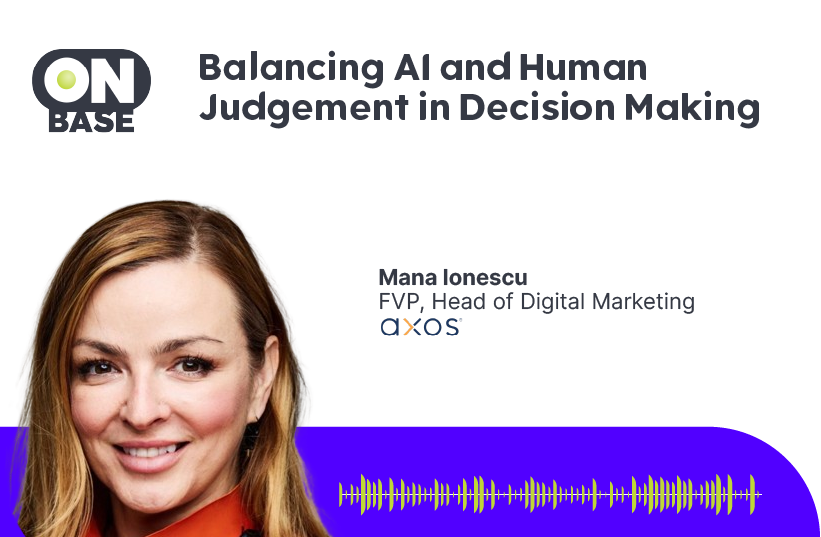
Balancing AI and Human Judgement in Decision Making
Shownotes
In this episode, Mana guides on implementing ethical and unbiased practices when using AI in marketing. She emphasizes the importance of ensuring data diversity, regular model audits, and transparency around how AI makes decisions to avoid bias. Mana suggests marketers ask fundamental questions about AI models, such as how they avoid overfitting, to validate outputs and understand the reasoning behind recommendations, especially for high-stakes decisions. Overall, the discussion highlights the potential for AI to create new opportunities in marketing by enabling more data-driven, scientific practices, and recommends that marketers learn about machine learning concepts to become more proficient in this area.
Best Moments
-
Chris asks Mana about fundamental questions marketers should ask to validate the outputs and assumptions of AI models. Mana recommends asking about how the model addresses overfitting as a key question.
-
Mana explains the importance of understanding overfitting in AI models and how it can be avoided through practices like diverse data sets, performance metrics, scenario analysis, and model validation.
-
Mana coins the quote "Knowing is sexier than not knowing" when discussing the importance of transparency and visibility into how AI models make decisions.
-
Mana emphasizes the need to be cautious of claims about AI-powered tools, as many may not be using true AI capabilities, and stresses the importance of implementing proper governance and controls.
About the guest
Mana Ionescu is a digital marketing leader and Head of Digital Marketing at Axos Bank in San Diego. A former agency founder, Mana loves to demystify complex marketing concepts and debunk digital marketing myths. She teaches at the Kellogg Professional Certificate in Digital Marketing and is a sought-after keynote. In her free time, Mana likes to explore the peaks and valleys of our beautiful earth: hiking and SCUBA diving.
Key takeaways
- Implement ethical and unbiased AI practices through diverse data, regular audits, and transparency
- Ask fundamental questions about AI models, like how they avoid overfitting, to validate outputs
- Maintain visibility into the “why” behind AI recommendations, especially for high-stakes decisions
- Embrace AI’s potential to create new opportunities in marketing by enabling more data-driven, scientific practices
- Recommend that marketers learn about machine learning concepts to become more proficient
Quotes
“We can’t have a black box. You need to be able to explain to stakeholders how the AI models work and the risks involved.” -Mana Ionescu
Highlights from this episode
How do we balance AI’s speed and accuracy benefits while ensuring ethical and unbiased decision-making?
According to Mana Ionescu, there are a few key practices to balance the speed and accuracy benefits of AI while ensuring ethical and unbiased decision-making:
- Diverse data sets: Ensure the data used to train AI models is wide, diverse, and representative of all demographics to minimize bias.
- Regular audits: Implement a governance framework with regular audits to check the models for accuracy, fairness, and alignment with ethical standards.
- Transparency: Work closely with data scientists to understand and be able to explain how the AI models work, what went into them, and how they are making decisions.
- Human oversight: Establish governance teams to provide human oversight and ensure the AI models are operating within ethical guidelines.
By implementing these practices, organizations can harness the speed and accuracy benefits of AI while mitigating the risks of unethical or biased decision-making.
What fundamental questions should marketers ask to validate the outputs and assumptions of AI or predictive models?
According to Mana Ionescu, some key fundamental questions marketers should ask to validate the outputs and assumptions of AI or predictive models include:
- “How do you address overfitting?” Overfitting is a common issue where the model learns too closely to the training data and performs poorly on new data. Understanding how the model avoids overfitting is crucial.
- “Where does the data come from? Do you have enough data? Is it reliable and representative?” Ensuring the data used to train the model is high-quality and diverse is essential for accurate outputs.
- “How are you going to measure the model’s performance, bias, and fairness?” Marketers should understand the metrics and validation methods used to assess the model’s accuracy and fairness.
- “How does the model perform under different scenarios? Can you stress test it with edge cases?” Evaluating the model’s robustness and ability to handle a variety of situations is important.
How does the size and diversity of the data impact the reliability of AI model outputs?
According to Mana Ionescu, the size and diversity of the data used to train AI models has a significant impact on the reliability of the model outputs:
- Data size: Larger, more comprehensive data sets allow the model to learn patterns and make more accurate predictions. Smaller data sets can lead to overfitting and poor performance on new data.
- Data diversity: Diverse data that represents a wide range of scenarios, demographics, and edge cases helps the model learn more generalized patterns. This reduces bias and improves the model’s ability to make reliable predictions across different situations.
Mana explains that data scientists use multiple models and statistical methods to test the reliability of the outputs, as the model is built upon a series of algorithms and data inputs. Ensuring the data is high-quality, representative, and comprehensive is crucial for developing reliable AI models.
In what situations is it necessary for marketers to see the “why” behind AI recommendations, and why is this important?
According to Mana Ionescu, marketers must have visibility into the “why” behind AI recommendations in the following situations:
- High-stakes decisions: For decisions that have a significant impact, such as loan approvals or medical diagnoses, it’s crucial to understand the reasoning behind the AI’s recommendations to ensure they are accurate and unbiased.
- Compliance and regulatory requirements: In industries like finance and healthcare, regulations mandate that AI models used for certain decisions are transparent and their decision-making process is explainable.
- Bias detection and mitigation: Understanding the “why” behind AI recommendations allows marketers to identify and address any potential biases in the model.
- Building trust with stakeholders: Providing transparency into how the AI is making decisions helps build trust with internal teams, executives, and customers who are relying on those recommendations.
- Improving the model: Visibility into the “why” enables marketers to better understand the model’s strengths and weaknesses, allowing them to refine and improve it over time.
What are some of the practices or regulations that exist in different industries like financial services to ensure fair and non-discriminatory use of AI?
Mana mentioned several key practices and regulations in place to ensure the fair and non-discriminatory use of AI in industries like financial services:
- In financial services, regulations like the Fair Credit Reporting Act and the Equal Credit Opportunity Act require that AI models used for lending and credit decisions are fair and non-discriminatory.
- The healthcare industry has regulations like HIPAA that mandate the fair use of AI in medical decisions.
- General practices include:
- Algorithmic accountability – ensuring transparency and understanding of how AI models make decisions
- Bias mitigation – implementing controls to identify and address biases in the data and models
- Ethics and governance frameworks – establishing guidelines and oversight to ensure ethical AI practices
These regulations and practices are crucial to avoid the risks of biased or discriminatory AI-powered decisions, especially in high-stakes scenarios.
Shout-outs
–Jill Rowley, GTM Advisor & LP at Stage 2 Capital
–Jon Miller, Former CMO at Demandbase and Co-founder at Marketo and Engagio
–Andy Crestodina, Co-Founder and CMO at Orbit Media

We have updated our Privacy Notice. Please click here for details.





